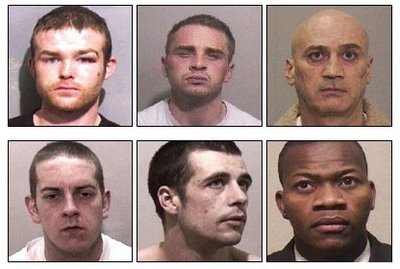Human rights deja-vu.
 Sometimes, you have to feel sympathy for government ministers, especially those responsible for bringing in the Human Rights Act, and who today have to defend it when the police and media jump to blame it for every single conceivable modern ill. It also brings an overwhelming feeling of deja-vu when you read the same old rubbish about it being perpetuated again and again.
Sometimes, you have to feel sympathy for government ministers, especially those responsible for bringing in the Human Rights Act, and who today have to defend it when the police and media jump to blame it for every single conceivable modern ill. It also brings an overwhelming feeling of deja-vu when you read the same old rubbish about it being perpetuated again and again.Today, the Sun reports the Northumbria Police haven't even bothered to read the incredibly clear 18 articles which make it obvious that what they're refusing to do is not just allowed, but almost encouraged by the Act:
SENIOR cops are keeping details of suspected criminals who are on the run secret — to protect THEIR human rights.Northumbria Police have released the names and pictures of five suspects they are desperate to trace.
But astonishingly, senior officers have refused to reveal details of the alleged offences.
Cops say they are sticking to Home Office guidelines and the Human Rights’ Act.
This comes only a month or so after the last Human Rights Act outrage, when Derbyshire police blamed the HRA for not producing photographs of two murderers who had absconded from open prison. This is a slightly different case, as it involves men who are only accused, rather than being convicted, but the HRA and the ACPO guidelines are still fairly clear.
The "offending" article is Article 8, the right to respect for family and private life:
2. There shall be no interference by a public authority with the exercise of this right except such as is in accordance with the law and is necessary in a democratic society in the interests of national security, public safety or the economic well-being of the country, for the prevention of disorder or crime, for the protection of health or morals, or for the protection of the rights and freedoms of others.
And here's the ACPO guidelines (the PDF in full is available from here) on releasing photographs. Notice that there's no explicit advice on not revealing why a suspect is wanted:
Article 8 of the Human Rights Act gives everyone the right to respect for his or her private and family life, home and correspondence, and publication of photographs could constitute a breach of this. The article does however allow the publication in accordance with law and as is necessary in a democratic society in the interests of national security, public safety or the economic well-being of the country, for the prevention of disorder or crime, for the protection of public health or morals or for the protection of the rights and freedoms of others. However, the Act requires that action taken under it is proportionate, and this is a particular consideration in respect of the nature of publication (for example the geographical reach and longevity of publication).
There's absolutely nothing there to suggest that making public why someone is wanted in connection with a crime would breach the act. The real concern would be over whether the evidence against the person wanted is strong enough to lead to a prosecution; sending out wanted posters with someone's face all over them with the alleged crime, only for them to be later found not guilty, could lead to potential defamation of character cases. This though is nothing to do with the Human Rights Act, but with the libel laws. If the police are concerned enough to release photographs, then there's nothing to stop them naming what they're accused of.
Article 5 also doesn't provide any solace for someone wanted in connection with a committed offence:
c) the lawful arrest or detention of a person effected for the purpose of bringing him before the competent legal authority on reasonable suspicion of having committed an offence or when it is reasonably considered necessary to prevent his committing an offence or fleeing after having done so;
The entire thing is ridiculous, and it's down to Northumbria police reading the law wrong or just being far too cautious. They've already released the names and photographs of the wanted men, they're just refusing to say what they're wanted in connection with, and as anyone who watches Crimewatch will tell you, they've been doing both for years and haven't run into any problems yet.
As always, the opportunist politicians jump at the chance of getting their soundbites and names into the papers:
North East Conservative Euro MP Martin Callanan said: “This is yet another instance of the rights of suspected criminals being put before those of the law-abiding population.”
Really? Even without their alleged crimes being made public, they're still having their names and photographs published. It's not as if the police are refusing to do anything whatsoever.
A Northumbria Police spokesman said: “When deciding to release photos of people wanted on warrant there are strict criteria which must be met.”
Err? You've already released their photographs, so the strict criteria must have been met. Did someone not tell him what the "controversy" is all about, or has he got the wrong end of the stick?
The Sun article itself doesn't bother to mention that all the men are wanted for not turning up at court, as well as any other charges, as this article from the Newcastle Evening Chronicle makes clear. It also prints the mugshots of all six men, while the Sun only bothers to display the one of Casey. Northumbria Police's own page on the six men is here.
Labels: deja-vu, human rights act, Northumbria police, Scum-watch, Sun-watch

